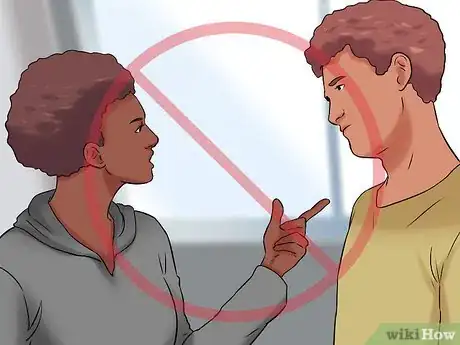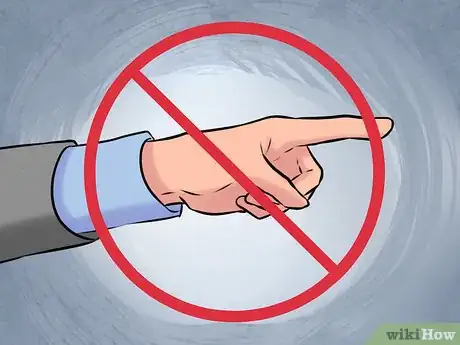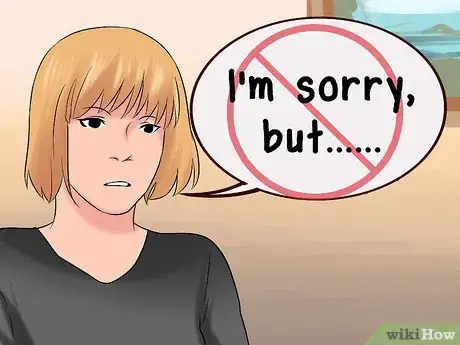This article was co-authored by Steven Hesky, PhD. Dr. Steven Hesky is a Licensed Clinical Psychologist with over 37 years of experience. He specializes in long-term psychotherapy with adults and adolescents. His training includes Freudian, Jungian, and Existential approaches to psychotherapy, hypnosis, family therapy, marriage counseling, and biofeedback. Dr. Hesky holds a BA in Philosophy from Lake Forest College and an MA and PhD in Existential Clinical Psychology from Duquesne University.
This article has been viewed 464,112 times.
Apologies can be difficult. You may not want to apologize out of pride or fear. Your relationship with your mother is important. Apologies are worth the stress they entail. Before you apologize, think things through. Plan what you want to say. Then, sincerely apologize to your mom. Give her time, however. It may take your mom a while to accept your apology.
Steps
Assembling Your Apology
-
1Let go of blame. Oftentimes, you may go into an apology feeling hesitant or resentful. If you feel something wasn't your fault, you may think an apology is unnecessary. However, if you made a mistake that hurt your mom, an apology is important. You need to acknowledge your part in hurting another person. Do not blame others for your actions. Self-blame is the only way for you to realize the weight and significance of your actions.
- Give yourself time to calm down before you approach her.[1]
- You may feel the mistake was not 100% your doing. This is probably true. There are few situations in life where the blame completely falls on a single individual. External factors can easily influence a decision and can contribute to a mistake.
- An apology, however, is not about who or what is to blame. An apology is about taking responsibility, however small, for your actions. Even if your mistake was mostly caused by other people or a situation, it hurt your mother.
- For example, you were talked into blowing off your mom's birthday party by your brother. While it was your brother's idea, you still blew off the party. You need to take responsibility for that.
-
2Think about writing a letter. You do not have to give an apology in person. A thoughtful letter can be just as effective. In certain situations, it may be more effective to write a letter.[2]
- If you're very nervous or embarrassed, a letter may make more sense. For an apology to be effective, it should be thorough and sincere. If you worry about expressing your feelings fully in person, writing a letter is probably a good option.
- This also may be a good option if your mom tends to be somewhat difficult to talk to. If you're worried your mom will get angry, and prevent you from talking, send her a thoughtfully written letter. For example, if your mom is still very mad about you blowing off her party, a face-to-face apology could easily turn into an argument. A letter is probably a better route. You want to make sure your words are understood.
Advertisement -
3Strive to be sincere. A sincere apology is more likely to be accepted. Before going in to apologize, spend some time reflecting on your actions. This will help you form a sincere understanding of why what you did was wrong, allowing you to offer an apology.
- Think about why what you did was wrong. Consider your role in the mistake, and how it hurt others. Make sure you're ready to admit this. Rehearse what you want to say, watching to make sure you accept your part in the wrongdoing.
- For example, don't say, "I'm sorry my friend Sarah convinced me to take your car without asking." Instead, say, "I'm sorry for taking your car without asking." You want to make sure your mom sees you sincerely and understands you acted poorly.
- Do not attempt to apologize until you know you mean your words. You may have to spend some time reflecting, and rehearse your apology several times. Try to empathize with your mother. Consider how you would feel in her position.
-
4Figure out concrete ways to make up for your mistake. An apology should be the beginning and not the end. In addition to apologizing, you will need to show your mother you've learned and are willing to change. Think of a few ways you could show your mom you will make up for the mistake.[3]
- Expressing remorse will feel empty if you don't let your mom know how you're willing to change. Think about what you did, and write down a few ways you can make sure it does not happen again in the future.
- For example, you took your mom's car with your friend. Think about the circumstances that led to this. Maybe this friend tends to get you into trouble a lot. Maybe you were consuming alcohol at the time, lowering your inhibitions. You could say something like, "I will try to spend less time with Sarah, especially when I'm drinking. I don't like the person I am when I drink, and I know I shouldn't let her drag me into these things."
Offering a Sincere Apology
-
1Begin with a sincere expression of remorse. The best way to begin an apology is to start at the beginning. The point of apologizing is to express remorse, so do that right away without hesitance. Your apology should begin with something like, "I'm incredibly sorry for what I did and how it hurt you."[4]
- Remember to strive for sincerity. If you don't genuinely feel sorry, your mom can pick up on this. Make sure to go into the situation with your mom's feelings in mind. Ask yourself how she would feel in the same situation.
- If you're writing a letter, the same rule applies. You can open the letter with something like, "Dear Mom, I'm sincerely sorry for the way my actions hurt you."
-
2Express regret. Regret should come immediately after the initial apology.[5] Regret shows that you genuinely reflected on your mistake, and understand why your actions were wrong. Whether apologizing in person or a letter, express regret immediately after the initial "I'm sorry."[6]
- Always take full responsibility for your actions. While you can certainly explain the circumstances surrounding your actions, do not do so in a way that denies your wrongdoing.
- For example, say something like, "I was drinking the night we took your car, and Sarah can be very pushy with me. However, there's no excuse for what we did. Even though I was not myself that night, I should have known that behavior was unacceptable."
-
3Acknowledge your mother's feelings. This can be the hardest part of apologizing. It can be painful to recall how your actions hurt someone. However, this is one of the most important parts of apologizing. Your mom will feel better if her feelings are acknowledged.[7]
- Spend a few sentences imagining what your mom may have felt. Express remorse for your part in making her feel this way.
- For example, "You must have been incredibly worried not knowing where the car was. When you found out I had it, I imagine you felt betrayed and disappointed. I'm sure the whole night was unbelievably stressful for you. I truly regret putting you in that position. I hate that my behavior affected you in this way."
-
4Do not assign blame. You should never assign blame during an apology. You may not be completely in control of your actions. However, you're not apologizing for the circumstances surrounding your behavior. You're apologizing for your role in that behavior. Keep this in mind throughout the apology.[8]
- When explaining yourself, be brief and avoid any explanations that can sound like excuses.
- For example, "I'm sorry Sarah convinced me to take the car." While your friend may have pushed you into your mistake, you still made it. A more effective apology would be something like, "I'm sorry I did not stand up to Sarah and took the car without asking."
-
5Ask for forgiveness. You should always end an apology with a request for forgiveness. This leaves the door open for reconciliation. You can end your apology with something simple, like, "I hope you can find a way to forgive me moving forward."[9]
- Understand forgiveness takes time, especially when a big mistake is involved. Try to acknowledge this when asking for forgiveness. For example, you can add something like, "I understand it may be a while before you can let go of this hurt. Take as much time as you need."
Avoiding Common Mistakes When Apologizing
-
1Give your mom time and space, if necessary. You cannot always expect an apology to be accepted right away. Time may be necessary for forgiveness if you've made a big mistake. Be willing to give your mother the time she needs to forgive you.
- If you're apologizing, understand the words "I'm sorry" will not be enough. If you made a mistake that seriously betrayed your mother's trust, the apology is only the beginning of a healing process.
- In the weeks that come, avoid using your apology to deny your mother's feelings. She may still be hurt for a while, and if she expresses as much, accept this and be patient. Avoid saying things like, "Well, I apologized a week ago. What more do you want?"
-
2Do not use non-apology language. Language can sometimes take away the power of an apology. Watch your language while apologizing. Make sure you don't use any words or phrases that can make your apology sound more like an excuse.
- One of the biggest mistakes is saying something like, "I'm sorry, but..." If you feel inclined to add a "but," refrain from doing so. Simply skip to apologizing for your actions.
- Also, remember you're apologizing for your actions. You are not apologizing for the circumstances or for your mother's feelings. Do not say, "I'm sorry what I did upset you." Say, "I'm sorry for what I did." Do not say, "I'm sorry the situation got out of control." Instead, say, "I'm sorry for my part in the situation."
-
3Give your mom space before apologizing, if necessary. You may want to apologize as soon as you can. However, remember that your apology is about your mother and not you. If your mom does not seem ready to listen to you, give it a few days before you attempt to apologize.
- If your mom seems very angry, you may not want to apologize right away. If your mom is hurt and upset, she will not be as willing to listen to your side.
- Don't give it more than a few days, however. Waiting weeks to apologize can make you come off as cold. It may look like you did not feel an apology was necessary. Do not wait more than a few days before attempting an apology.
-
4Back up your apology with actions. An apology is a means to an end. It's not an end on its own. After laying out several concrete ways you can change, follow through on this. Show your mom you've learned from your mistakes in addition to telling her.[10]
- Think about the potential causes of your actions. How can you go about preventing these actions from occurring in the future? Think of several ways you can change, and follow through on these actions.
- For example, you borrowed your mom's car without asking while hanging out with a troublesome friend and drinking. You can stop drinking and limit your contact with this friend. You can also be more upfront with your mom about where you're going and who you're with. Strive to be more respectful of her rules.
Expert Q&A
-
QuestionHow can I control my anger towards my mother?
 Steven Hesky, PhDDr. Steven Hesky is a Licensed Clinical Psychologist with over 37 years of experience. He specializes in long-term psychotherapy with adults and adolescents. His training includes Freudian, Jungian, and Existential approaches to psychotherapy, hypnosis, family therapy, marriage counseling, and biofeedback. Dr. Hesky holds a BA in Philosophy from Lake Forest College and an MA and PhD in Existential Clinical Psychology from Duquesne University.
Steven Hesky, PhDDr. Steven Hesky is a Licensed Clinical Psychologist with over 37 years of experience. He specializes in long-term psychotherapy with adults and adolescents. His training includes Freudian, Jungian, and Existential approaches to psychotherapy, hypnosis, family therapy, marriage counseling, and biofeedback. Dr. Hesky holds a BA in Philosophy from Lake Forest College and an MA and PhD in Existential Clinical Psychology from Duquesne University.
Licensed Clinical Psychologist Focus on your regret. Feeling regret about a past outburst can motivate you to act differently, to understand yourself better, and to even seek help.
Focus on your regret. Feeling regret about a past outburst can motivate you to act differently, to understand yourself better, and to even seek help. -
QuestionIf I do all of the above, and she still doesn't forgive me, what do I do?
 Community AnswerGive it time. For a big mistake, your mom needs more than apology. Be patient and back up your words with actions. You cannot force someone to forgive you, but you can try your best to encourage them to do so.
Community AnswerGive it time. For a big mistake, your mom needs more than apology. Be patient and back up your words with actions. You cannot force someone to forgive you, but you can try your best to encourage them to do so. -
QuestionWhat if she yells at you to go away?
 Community AnswerShe may not be ready to hear your apology yet. Try giving her a few days. However, if this behavior is typical of your mother, she may not be the type to benefit from a face-to-face apology. Write a letter instead.
Community AnswerShe may not be ready to hear your apology yet. Try giving her a few days. However, if this behavior is typical of your mother, she may not be the type to benefit from a face-to-face apology. Write a letter instead.
Warnings
- Remember, it may take a while for an apology to be accepted. If you made a serious mistake, you can't expect your mom to forgive you right away.⧼thumbs_response⧽
References
- ↑ Steven Hesky, PhD. Licensed Clinical Psychologist. Expert Interview. 2 September 2021.
- ↑ http://www.professional-counselling.com/how-to-apologise.html
- ↑ https://www.psychologytoday.com/blog/the-dance-connection/201409/the-9-rules-true-apologies
- ↑ https://www.psychologytoday.com/blog/the-squeaky-wheel/201311/the-five-ingredients-effective-apology
- ↑ Steven Hesky, PhD. Licensed Clinical Psychologist. Expert Interview. 2 September 2021.
- ↑ https://www.psychologytoday.com/blog/the-squeaky-wheel/201311/the-five-ingredients-effective-apology
- ↑ https://www.psychologytoday.com/blog/the-squeaky-wheel/201311/the-five-ingredients-effective-apology
- ↑ https://www.psychologytoday.com/blog/the-dance-connection/201409/the-9-rules-true-apologies
- ↑ https://www.psychologytoday.com/blog/the-squeaky-wheel/201311/the-five-ingredients-effective-apology
About This Article
If you've made a great mistake and want to say sorry to your mother, try to do it in person, or write it down in a letter if you are scared. Begin with a sincere apology, like, "I'm incredibly sorry for what I did and how it hurt you." You should also express regret, so your mom knows you're taking responsibility for your actions. For example, admit your mistake and add something like, "There's no excuse for what I did. I should have known my behavior was unacceptable." From here, be sure to acknowledge your mother's feelings, especially if what you did upset her. Then, ask for forgiveness by including something like, "I hope you will forgive me, but I understand it may be a while before you can let go of this hurt." For more advice, like how to avoid common mistakes when apologizing, read on.












































































